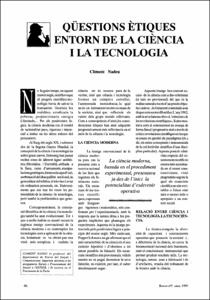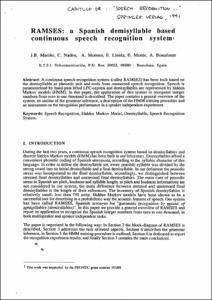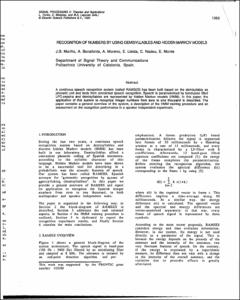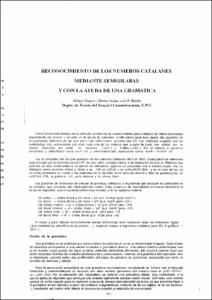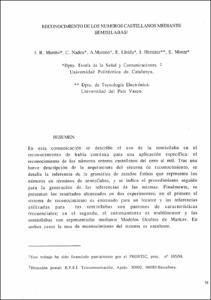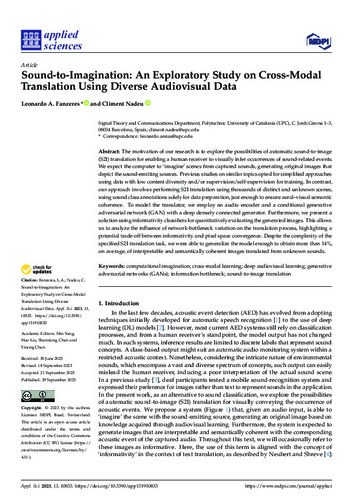Exploració per autor "Nadeu Camprubí, Climent"

Ara es mostren els items 101-120 de 140
-
Qüestions ètiques entorn de la ciència i la tecnologia

Nadeu Camprubí, Climent (Escola Tècnica Superior d'Enginyers de Telecomunicació de Barcelona, 1995)
Nadeu Camprubí, Climent (Escola Tècnica Superior d'Enginyers de Telecomunicació de Barcelona, 1995)
Article
Accés obert -
Ramses: a Spanish demisyllable based continuous speech recognition system

Mariño Acebal, José Bernardo; Nadeu Camprubí, Climent; Lleida Solano, Eduardo; Monte Moreno, Enrique; Moreno Bilbao, M. Asunción (Springer, 1990)
Mariño Acebal, José Bernardo; Nadeu Camprubí, Climent; Lleida Solano, Eduardo; Monte Moreno, Enrique; Moreno Bilbao, M. Asunción (Springer, 1990)
Text en actes de congrés
Accés obertA continuous speech recognition system (called RAMSES) has been built based on the demisyllable as phonetic unit and tools from connected speech recognition. Speech is parameterized by band-pass lifted LPC-cepstra and ... -
Real-time multi-microphone recognition of simultaneous sounds in a room environment

Chakraborty, Rupayan; Nadeu Camprubí, Climent (Institute of Electrical and Electronics Engineers (IEEE), 2013)
Chakraborty, Rupayan; Nadeu Camprubí, Climent (Institute of Electrical and Electronics Engineers (IEEE), 2013)
Text en actes de congrés
Accés restringit per política de l'editorialTime overlapping of acoustic signals, which so often occurs in real life, is a challenge for current state-of-the-art sound recognition systems. In this work, we propose an approach for detecting, identifying and ... -
Recognition of Numbers and Strings of Numbers by Using Demisyllables: One Speaker Experiment

Mariño Acebal, José Bernardo; Nadeu Camprubí, Climent; Moreno Bilbao, M. Asunción; Monte Moreno, Enrique (1989)
Mariño Acebal, José Bernardo; Nadeu Camprubí, Climent; Moreno Bilbao, M. Asunción; Monte Moreno, Enrique (1989)
Text en actes de congrés
Accés obertThis communication reports the use of demisyllables for continuous speech recognition in a specific application: the recognition of Spanish numbers. After a brief outline of the recognition system, a description of ... -
Recognition of numbers by using demisyllables and hidden Markov models

Mariño Acebal, José Bernardo; Bonafonte Cávez, Antonio; Moreno Bilbao, M. Asunción; Lleida Solano, Eduardo; Nadeu Camprubí, Climent; Monte Moreno, Enrique (Elsevier, 1990)
Mariño Acebal, José Bernardo; Bonafonte Cávez, Antonio; Moreno Bilbao, M. Asunción; Lleida Solano, Eduardo; Nadeu Camprubí, Climent; Monte Moreno, Enrique (Elsevier, 1990)
Text en actes de congrés
Accés obert -
Reconocimiento de los numeros catalanes mediante semisilabas y con..

Nadeu Camprubí, Climent; Mariño Acebal, José Bernardo (1990)
Nadeu Camprubí, Climent; Mariño Acebal, José Bernardo (1990)
Text en actes de congrés
Accés obert -
Reconocimiento de los números castellanos mediante semisílabas

Mariño Acebal, José Bernardo; Nadeu Camprubí, Climent; Monte Moreno, Enrique (1989-12)
Mariño Acebal, José Bernardo; Nadeu Camprubí, Climent; Monte Moreno, Enrique (1989-12)
Article
Accés obertEn esta comunicación se describe el uso de la semisílaba en el reconocimiento de habla continua para una aplicación específica: el reconocimiento de los números enteros castellanos del cero al mil. Tras una breve descripción ... -
Reconocimiento de los números castellanos mediante semisílabas

Mariño Acebal, José Bernardo; Nadeu Camprubí, Climent; Moreno, Antonio; Lleida Solano, Eduardo; Hernaez, I.; Monte Moreno, Enrique (1989-12)
Mariño Acebal, José Bernardo; Nadeu Camprubí, Climent; Moreno, Antonio; Lleida Solano, Eduardo; Hernaez, I.; Monte Moreno, Enrique (1989-12)
Article
Accés obertEn esta comunicación se describe el uso de la semisílaba en el reconocimiento de habla continua para una aplicación específica: el reconocimiento de los números enteros castellanos del cero al mil. Tras una breve descripción ... -
Reconocimiento del habla en ambientes ruidosos mediante modelos ocultos de Markov discretos

Hernando Pericás, Francisco Javier; Nadeu Camprubí, Climent (1992)
Hernando Pericás, Francisco Javier; Nadeu Camprubí, Climent (1992)
Text en actes de congrés
Accés obertSpeech recognition in noisy environments remains an unsolved problem, even in the case of isolated word recognition with small vocabularies. Recently, several techniques have been proposed to alleviate this problem. ... -
Reconocimiento del locutor mediante filtrado frecuencial de energías espectrales estimadas por métodos híbridos

Hernando Pericás, Francisco Javier; Nadeu Camprubí, Climent (Universidad Politecnica de Madrid, 2000)
Hernando Pericás, Francisco Javier; Nadeu Camprubí, Climent (Universidad Politecnica de Madrid, 2000)
Text en actes de congrés
Accés obertSe han explorado dos formas de obtener parámetros más robustos para reconocimiento del locutor: la hibridación de técnicas de análisis espectral y el filtrado frecuencial de las energías de las bandas. Se ha comprobado que ... -
Reconocimiento robusto del habla con parametrización lpc

Nadeu Camprubí, Climent (1990)
Nadeu Camprubí, Climent (1990)
Text en actes de congrés
Accés obertCepstral coefficients obtained by means of a linear predictive analysis (LPC) of either the signal or a related sequence have given remarkable robustness against additive Gaussian white noise. From a comparative study of ... -
Reconocimiento robusto del habla en presencia de ruido de coche

Hernando Pericás, Francisco Javier; Nadeu Camprubí, Climent (1993)
Hernando Pericás, Francisco Javier; Nadeu Camprubí, Climent (1993)
Text en actes de congrés
Accés obertThe performance of existing speech recognition systems degrades rapidly in the presence of background noise when training and testing cannot be done under the same ambient conditions. The aim of this paper is to report the ... -
La Responsabilitat social dels professionals de la ciència i la tecnologia

Nadeu Camprubí, Climent (Escola Tècnica Superior d'Enginyers de Telecomunicació de Barcelona, 1995)
Nadeu Camprubí, Climent (Escola Tècnica Superior d'Enginyers de Telecomunicació de Barcelona, 1995)
Article
Accés obert -
Responsabilitat social, codis d'ètica i formació dels enginyers

Nadeu Camprubí, Climent (Càtedra Unesco a la UPC de Sostenibilitat, 2004-05)
Nadeu Camprubí, Climent (Càtedra Unesco a la UPC de Sostenibilitat, 2004-05)
Article
Accés obertLa responsabilitat social dels enginyers s'amplia a mesura que progressa el desplegament tecnològic i se'n constaten les conseqüències. Això queda reflectit en més o menys grau en els documents i les actuacions de les ... -
Robust speech parameters located in the frequency domain

Hernando Pericás, Francisco Javier; Nadeu Camprubí, Climent (1997)
Hernando Pericás, Francisco Javier; Nadeu Camprubí, Climent (1997)
Text en actes de congrés
Accés obertIn this paper, two ways of obtaining more robust spectral parameters are explored. Firstly, an hybridization of both LP and filter-bank approaches is considered, which is capable of improving recognition results for both ... -
Rudiments of spatial audio synthesis

Girbau Xalabarder, Andreu; Nadeu Camprubí, Climent (2017-02-15)
Girbau Xalabarder, Andreu; Nadeu Camprubí, Climent (2017-02-15)
Report de recerca
Accés obertFor many application areas the binaural synthesis has become a field of interest. In this paper, we present the basics of bin- aural synthesis for 2 channels -left and right- providing exam- ples and figures, using ... -
Selección de caracterísitcas en el reconocimiento automático del habla

Lleida Solano, Eduardo; Nadeu Camprubí, Climent; Mariño Acebal, José Bernardo (1990)
Lleida Solano, Eduardo; Nadeu Camprubí, Climent; Mariño Acebal, José Bernardo (1990)
Text en actes de congrés
Accés obertIn this paper we investigate the use of a feature selection step in a isolated word recognition system. The feature selection step tries lo modal the correlalion among dajacent feature vectors and the variabilily of the ... -
Simbad: a tool for speech analysis and synthesis

Nadeu Camprubí, Climent; Mariño Acebal, José Bernardo; Oliveras Vergés, Albert (1990)
Nadeu Camprubí, Climent; Mariño Acebal, José Bernardo; Oliveras Vergés, Albert (1990)
Text en actes de congrés
Accés obertSIMBAD has been developed to facilitate the tasks involved in the design of a concatenative speech synthesis system: 1) building a dictionary of parameterized speech units, and 2) obtaining a set of rules to concatenate ... -
Sound-model-based acoustic source localization using distributed microphone arrays

Chakraborty, Rupayan; Nadeu Camprubí, Climent (Institute of Electrical and Electronics Engineers (IEEE), 2014)
Chakraborty, Rupayan; Nadeu Camprubí, Climent (Institute of Electrical and Electronics Engineers (IEEE), 2014)
Text en actes de congrés
Accés restringit per política de l'editorialAcoustic source localization and sound recognition are common acoustic scene analysis tasks that are usually considered separately. In this paper, a new source localization technique is proposed that works jointly with an ... -
Sound-to-imagination: an exploratory study on cross-modal translation using diverse audiovisual data

Areias Fanzeres, Leonardo; Nadeu Camprubí, Climent (Multidisciplinary Digital Publishing Institute, 2023-09-29)
Areias Fanzeres, Leonardo; Nadeu Camprubí, Climent (Multidisciplinary Digital Publishing Institute, 2023-09-29)
Article
Accés obertThe motivation of our research is to explore the possibilities of automatic sound-to-image (S2I) translation for enabling a human receiver to visually infer occurrences of sound-related events. We expect the computer to ...


